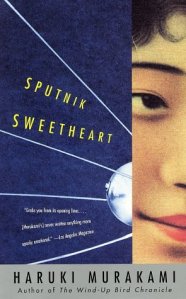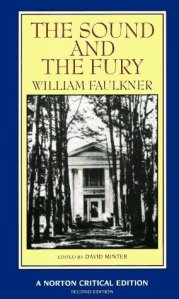
I just finished Murakami’s Sputnik Sweetheart (you can read the beginning here).
This is a love story that deals in loneliness–as is represented in the image of Sputnik II (which had Laika, a poor dog that was lost in space in the name of science). The story follows Sumrie through the eyes of a simply named narrator “K”. K tells the reader how Sumrie fell in love for the first time to an older, sophisticated, Korean wine seller, Miu.
K was madly in love with Sumrie, but comes to appreciate the pilgrim soul in her and realizes what a good friend she is when she disappears while on holiday with Miu.
Sumrie wants nothing more than to become a novelist (she likes Keorac though, so how good could she really be?). She quits college to pursue her goal and not waste time in class. While in college she meets K and they bond over discussions about books and art and music.
K is a history schoolteacher who loves books. He pines for Sumrie but has girlfriends (mostly older MILFS) keep him distracted. He is Sumrie’s best friend, and he is often awoken in the middle of the night when Sumrie has ideas lingering in her head that she wants to talk about right then and there.
Miu is the woman with whom Sumrie falls in love with for the first time. She is (or was) a piano virtuoso but had to give up the piano and run the family business when her father got sick and eventually died. She is a strong and assertive woman, but we come to learn that she is cold because she is missing “somthing.”
The plot moves along from past to present as K recalls how things happened. He tells the story of how Sumrie meets Miu at a wedding. They instantly hit it off, and Miu offers Sumrie a part time job. Since Sumrie jobless, she decides to take the job to make some extra money, but Sumrie lets Miu know that for her (Sumrie’s) writing comes first. The two hit it off and care deeply for each other.
Later, while away on business, they meet a Greek man who offers them his place on an island and they accept. They end up staying longer than they had initially anticipated. Then one night, Sumrie finally admits her love to Miu and her desire for Miu. Miu, as was mentioned earlier, is missing “something” and tells Sumrie she could do what she wanted but she really likes Sumrie. Sumrie, feeling dejected, wonders off in the middle of the night and disappears.
This is a beautifully written novel with some amazing prose, but there are moments of intense sexual desire/longing that go into graphic detail and seem almost out of place. (If I had the book in front of me I would quote it here, but this is (this right here that you are reading) my musing on the book now that I have some time).
My thoughts are scattered here, so let me just get to the stuff that really caught my attention.
First, we come to learn that Miu has no sexual feeling because once, while living in Paris, she ended up stuck on a ferris wheel. While on the ferris wheel she voyeuristically spies her own window from the ferris wheel. Suddenly, she she herself with a man she has met and thinks nothing about it. She watches herself ravish this man in the distance, and she is disgusted at how her “other” self could do this. She, at some point, passes out and wakes up in a hospital with her hair turned white at the young age of 23. Ever since that day, Miu has no sexual desire. Her piano playing, while better than her peers, ceases to win over audiences because it turns out her playing is lacking heart. In seeing her doppleganger, Miu loses something essential in herself that she cannot recover, and she suspects this other who she saw with this man, has that “thing.”
This was all very twilight zone for me, and I wasn’t sure what to make of it. I think looking at it from Jungian terms, this shadow of hers is the primitive, passionate side of her that she is afraid of, and in confronting that shadow– even if it was only this confrontation through looking at her double do these things that she desires but that she is afraid to do– affects her psyche and turns her hair white. This is further exemplified by her shadow having black hair, and the ferris wheel her having white hair.
Miu wonders if she is the real her. She worries that maybe this woman with this man, this other self, is the real her. Furthermore, she describes this event as looking into a mirror. Taking that into account, it made me think of Lacan’s mirror stage, in which infants come to realize their subjectivity. This is a moment where Miu realizes her “true” self– she realizes that she is missing passions which not only makes it hard for her to be intimate with other human beings but makes her music lack an essential quality.
Here is a nice summary of the mirror stage. It states that:
For Lacan, the mirror stage establishes the ego as fundamentally dependent upon external objects, on an other. As the so-called “individual” matures and enters into social relations through language, this “other” will be elaborated within social and linguistic frameworks that will give each subject’s personality (and his or her neuroses and other psychic disturbances) its particular characteristics.
So this might explain Miu’s neuroses in terms of her problems with sexual contact.
But, there seems to be a way to go into the mirror. So that this identification with the other in the mirror becomes not only the way for the “I” to emerge, but if it goes into the mirror then that distinction between I and other becomes blurred. It seems that Sumries disappearance is this. She goes into the mirror, through, theoritically, dreams.
She ends up callin K at the end of the novel. This shows the lonilness that the whole novel uses as a motfi. The phone is a way to talk to people without actually being together.
I am out of time though, and must leave– so maybe more on this later….


